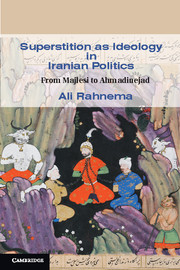Book contents
2 - Mohammad-Reza Shah Pahlavi's Supernatural Shiʿism and Its Political Implications
Published online by Cambridge University Press: 05 June 2012
Summary
THE DIVINELY GRACED CHILD
It is said that one night in Gonbad Kavus, Colonel Reza (later Reza Shah), still a member of the Cossack brigade, had a dream. The next day, Reza asked his servant, Yadollah Ardel, if he was at all familiar with interpreting dreams and divination based on dreams, before describing his own. He had dreamt that two candles were lit in his room. While Yadollah opined that the dream signified a double promotion for his master, Reza disagreed in amusement. Two days later, Reza received a telegram. His second wife, Taj ol-Moluk, had given birth to twins. Reza named them Mohammad-Reza and Ashraf. At the hands of his entourage, the dream about the two candles was later developed into a subtle, insinuated yet unsaid reference to a spiritual experience by Reza Shah. Despite Reza Shah's disinterest in spiritual matters, this incident has been implicitly referred to by some as proof of Reza Shah's spiritual dimension and supernatural agency. It seems as though, traditionally and historically, Iranian political leaders were required to have possessed some sort of supernatural power or force to separate them from the masses and infer upon them a particular status of leadership somehow connected with the hidden world.
- Type
- Chapter
- Information
- Superstition as Ideology in Iranian PoliticsFrom Majlesi to Ahmadinejad, pp. 114 - 136Publisher: Cambridge University PressPrint publication year: 2011



